Ross Cooper is the Elementary Principal of T. Baldwin Demarest Elementary School in the Old Tappan School District in New Jersey, co-author of Hacking Project Based Learning and was the Supervisor of Instructional Practice K-12 in the Salisbury Township School District in Allentown, PA at the time of the podcast.
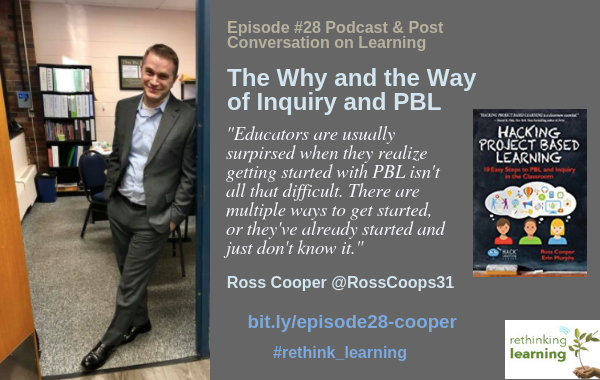
Podcast: Play in new window | Download
Subscribe: Spotify | TuneIn | RSS
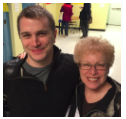
I have been following Ross on Twitter for years and was lucky to meet with him face-to-face at EduCon last year. Planning on meeting up again this year in Philadelphia. He along with Erin Murphy his co-author even hosted a twitter chat for Personalize Learning. Since our conversation, Ross became principal of a new school so that information is not in the podcast but we added it in this post. Below are some excerpts from the podcast.
Ross, tell me about you, your family, and your background
I grew up in Trumble, Connecticut and went through the Trumble school district which was a typical school system. For the most part, it wasn’t for me. I was one of those creative students who thought outside the box, but was not as good at school work. To me, it seemed like school only offered one way to learn, and I had to fit in the system. My grades were okay, but the school did not bring out my full potential.
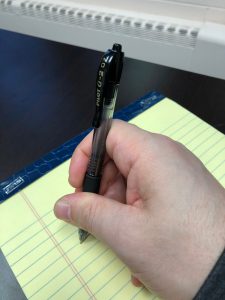
One example is the way I hold my pencil which is a weird way but it works for me. Specialists worked with me to change the way I hold my pencil, but I could never change it. They kept telling me I would have problems when I got older. I didn’t. It’s a perfect metaphor. Instead of saying go with what works best for you, they spent way too much time trying to change how I hold a pencil They wanted me to be like everyone else.
In middle school, I decided I wanted to be a teacher, mostly because I wanted to do things differently for children and be the teacher that the young Ross needed. My friends know me as a huge foodie especially dry age steak and pizza preferably from Connecticut or New York. I also was thinking of going to culinary school. I ended up going into education where I did some special ed full-time for 6 months in 3rd grade, then 6 years in 4th grade. I became an assistant principal for a year then 3 years as a curriculum specialist in Allentown, PA [Note: Ross is now principal at T. Baldwin Demarest Elementary School in the Old Tappan School District, New Jersey].
Share why you and Erin decided to write your book.
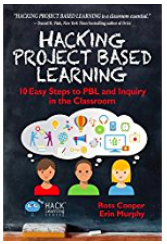 A lot of creative people are the outliers who have the confidence to do things their own way. They do not listen to the naysayers. You see educators who are outliers are writing more books than ever before because they use social media to share their writing immediately to attract people to their work. There are also more opportunities to publish with independent publishers. Project-based learning was a natural topic to write about. One of the lines I love is “Simplicity is the ultimate sophistication.” This is when you know a topic so well that you are able to communicate it in a very simple way so people can grasp it. Erin and I wanted to frame PBL in a simple way so it was very accessible so people would want to read it.
A lot of creative people are the outliers who have the confidence to do things their own way. They do not listen to the naysayers. You see educators who are outliers are writing more books than ever before because they use social media to share their writing immediately to attract people to their work. There are also more opportunities to publish with independent publishers. Project-based learning was a natural topic to write about. One of the lines I love is “Simplicity is the ultimate sophistication.” This is when you know a topic so well that you are able to communicate it in a very simple way so people can grasp it. Erin and I wanted to frame PBL in a simple way so it was very accessible so people would want to read it.
Structure and Design of the 10 Steps to PBL and Inquiry in the Classroom?
A lot of discussions around PBL are pie in the sky ideas like working on real-world problems or bringing in experts around a topic. We believed that could intimidate teachers. The work we do around PBL is using the Understanding by Design framework. Thinking about the different steps, we wanted to make the book as linear as possible. We structured the book around the 10 Hacks. Here are the first two hacks:
Hack #1: How can teachers develop a space that promotes risk-taking?
We start with building the culture in the classroom by bringing creativity. Culture is not an initiative. It is something you constantly work on. It is established and grows with PBL. Trying to fit PBL in a traditional classroom doesn’t work. Some teachers give up if it doesn’t work right away. If we expect our students to take risks, we need to take them as well. If we set the bar high, trust our students, and work with them, they will not only hit the bar but pass over it by leaps and bounds. Even if they are 8 or 9 and we treat them like adults, what they give back to you is jaw-dropping. Sometimes what we do is limited by our own comfort zones. If you are not comfortable doing something, then the students will also be uncomfortable. But if you do something and believe that something is going to happen, you will see students jump in.
Hack 2: Teaching collaboration skills. How can teachers harness what kids know individually and encourage them to work together?
We need to teach kids the steps to get along and effectively collaborate with others especially when you are trying to have them work in groups for PBL. Even as adults, we struggle with getting along with our peers. We all need explicit strategies. One thing I did in my classroom was the Marshmallow Challenge. Students in groups are given a marshmallow, raw spaghetti, string, and tape. Then in 18 minutes, each group tries to see how high they can get their marshmallows with the materials they have. Here’s a Ted Talk I shared with my students about the Marshmallow Challenge: Build a Tower, Build a Team with Tom Wujec
When I was teaching, I took risks also and modeled what I was doing along with metacognition, the why I was doing it. I encourage teachers to be involved, model and be hands-on with their students with any activity.
All of the Hacks…
In our book, we move through all of the hacks to get to Hack 10 where we finish the projects in style. It is important to infuse reflection, publish and share. Each hack includes what you can do tomorrow and a blueprint for full implementation. To make each of the hacks personal, there is an example in each chapter of a hack in action.
Want to learn more about PBL, make sure to get a copy of their book, Hacking PBL, and check out Ross and Erin’s FREE online course:
Hacking Project Based Learning http://bit.ly/2lX1TPU
We talked about some of your blog posts and included a few with links and graphics:
Learning Beliefs and how they intersect with PBL
Another recent post was on the 6 Drivers of Inquiry Learning. rosscoops31.com/6drivers
5 Ways to Promote Student Agency http://rosscoops31.com/agency
****
 Ross Cooper is the co-author of Hacking Project Based Learning and currently is the Elementary Principal of T. Baldwin Demarest Elementary School in the Old Tappan School District in New Jersey. Previously he was the Supervisor of Instructional Practice K-12 in the Salisbury Township School District in Allentown, PA. Before that, he was an elementary assistant principal for a year and before that a fourth-grade teacher in the East Penn School District for six years.
Ross Cooper is the co-author of Hacking Project Based Learning and currently is the Elementary Principal of T. Baldwin Demarest Elementary School in the Old Tappan School District in New Jersey. Previously he was the Supervisor of Instructional Practice K-12 in the Salisbury Township School District in Allentown, PA. Before that, he was an elementary assistant principal for a year and before that a fourth-grade teacher in the East Penn School District for six years.
Ross is an Apple Distinguished Educator and a Google Certified Innovator. His passions are inquiry-based learning and quality professional development. He regularly speaks, presents, and conducts workshops related to his writing and professional experiences. When he is not working, he enjoys eating steak and pizza, exercising, reading books, playing on his computer, and provoking his three beautiful nephews.
Email: RossCoops31@gmail.com
Twitter: @RossCoops31 #HackingPBL
Website: https://rosscoops31.com
Book on Amazon: Hacking Project-Based Learning: 10 Easy Steps to PBL and Inquiry in the Classroom
*****
For all of the Rethinking Learning podcasts with Barbara Bray, click on the podcast tab at the top, the logo below, or go to https://barbarabray.net/podcasts/
Go to this page for resources, questions, and more information about Barbara’s new book, Define Your WHY.



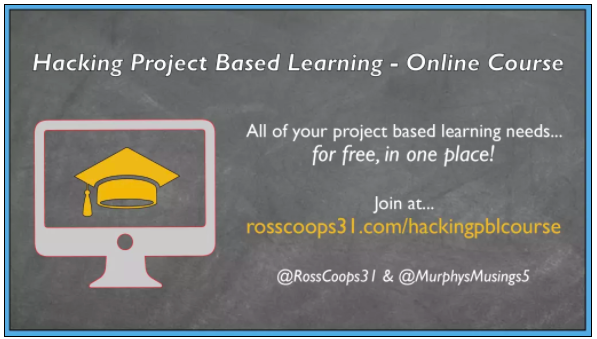
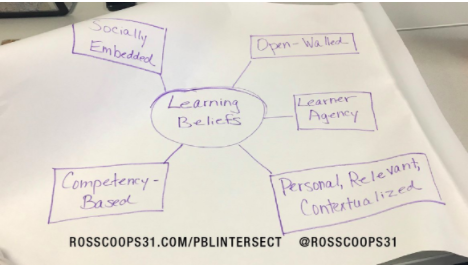
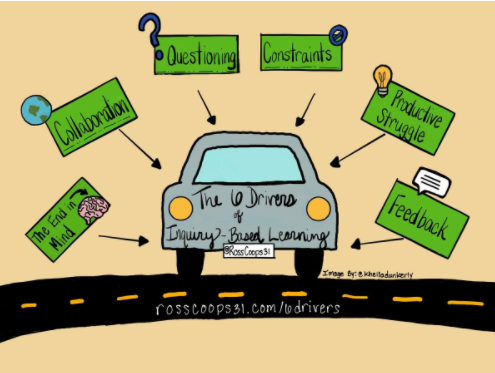
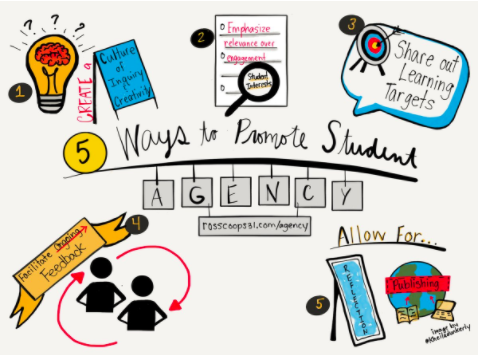




[…] Ross Cooper is the Elementary Principal of T. Baldwin Demarest Elementary School in the Old Tappan School District in New Jersey, co-author of Hacking Project Based Learning and and was the Supervisor of Instructional Practice K-12 in the Salisbury Township School District in Allentown, PA at the time of the podcast. I have been following …Read More […]
[…] The Why and The Way of Inquiry and PBL […]